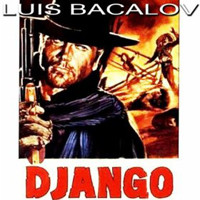- Composed by Luis Bacalov
- EMI / 2011 / 58:54
Django was probably the first spaghetti western I saw. It was introduced by Alex Cox on his wonderful Moviedrome series on BBC-2 back in the late 1980s. It’s got all the classic ingredients of the genre and Franco Nero is great as the titular antihero, a drifter first shown dragging a coffin behind him who fights a violent group holding sway over a town. It inspired a whole host of sequels and quasi-remakes and is probably the closest one of these films got to truly breaking through into the public consciousness apart from Sergio Leone’s. Quentin Tarantino’s Django Unchained – featuring the same character, though it’s neither sequel nor remake – will probably revive interest.
Of course, musically, Ennio Morricone is the composer most would associate with spaghetti westerns, but many other composers wrote great music for the genre and Argentinian composer Luis Bacalov is a leading member of that group. Django is one of the first western scores he wrote and it’s one of his very best, gloriously entertaining and right up there with Morricone’s legendary scores. The main theme is a classic, whether heard in instrumental form with the wonderful Hank Marvin-style guitar solo or in one of its vocal forms (the wonderfully-named Rocky Roberts sings it in English; Roberto Fia in Italian). Expansive and propulsive, it’s just a great theme, one of the most memorable of its type and it’s wonderful to hear how well Bacalov develops it over the course of the score (the brass version in “Espera y ataque” combines with dissonant action music for glorious effect).
There’s another incredible piece of music here, too, arguably even better – “La Corsa (second version)” doesn’t seem to have much to do with the first version, but is extraordinarily good, manic strings building in the opening bars up to a considerable frenzy before a stunning Morriconean trumpet solo and then the whole orchestra coming in for the explosive conclusion. It’s quintessential spaghetti western music, inspired and strangely beautiful, and it’s no surprise to find it used by Tarantino in his film.
“Vamonos muchachos” appears as the title of three different tracks, which offer the final of this score’s trio of brilliant ideas. Mariachi music combines with truly thrilling brassy action music – it’s pulse-pounding stuff, creative and intelligent in construction and quite gloriously entertaining. The reprise of the trumpet solo from “La Corsa” in the second piece is a real highlight. More laid-back Mexicana is heard in “Vals de Juana Yimena” and again in “Corrido”, both of which make me long to put on my sombrero and poncho and smoke a big cigar. “Preludio” (which bizarrely appears near the end of the album) is a witty piece of organ-based religiosa to accompany that unforgettable opening sequence.
There have been various album releases of Django over the years. The original 42-minute LP was great and contained all the highlights; that was released on CD by Alhambra in 1994. Screen Trax extended it to 55 minutes in 1996, much of the extra content being alternative versions of the wonderful main theme (including a karaoke version!) Even more of those alternative versions found their way onto Verita Note’s 75-minute definitive edition in 2007. Unfortunately none of the CD releases is that easy to come by these days, but Amazon and iTunes offer a download version with the same contents as the Screen Trax album; sound quality isn’t great, but it doesn’t hinder enjoyment of this masterpiece of a film score. It deserves a place in every collection and hopefully people will be inspired to seek out the whole thing after hearing the couple of tracks which Tarantino uses in his film.
Rating: *****
facebook.com/moviewave | twitter.com/MovieWaveDotNet | amazon.com













I wouldn’t want to say Bacalov is the better composer, but, if Morricone is Philip Glass, then Bacalov is Aaron Copland. In other words, Morricone often – not always – espouses a sort of minimalism nowhere to be found in Bacalov in this score (or some of his other more tango-based work). This is vibrant, exciting, melodic stuff. I’m listening to the Alhambra disc which, actually, has pretty solid sound.